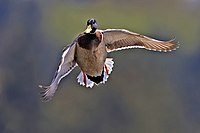H5N1 strain of Avian Flu found in the UK
Tuesday, November 13, 2007
Health officials in the United Kingdom have confirmed that the H5N1 strain of the Avian Flu has been found in turkeys on Redgrave Park Farm in Suffolk, England. The farm is owned by Gressingham Foods.

Officials also say that it is likely that the virus arrived in the U.K. by way of migrating birds and that the virus resembles the H5N1 strain that was discovered in August in Germany. Other possibilities of infection are currently being investigated by officials such as infected turkey food or being brought overseas by humans.
"Everybody needs to be concerned, this is avian influenza. We are asking every poultry keeper to be vigilant, to house their birds where they are required to do so in any restricted area and carry out good bio-security measures and report any signs of disease. This is a particularly challenging site and our priority is to adhere to strict bio-security, and the health and safety of staff on site is paramount," said Fred Landeg, a chief officer of veterinary medicine.
Health officials say that all of the birds on the farm, at least 5,000 ducks geese and turkeys, will be killed, most of which already have been. They have also designated a radius of three (1.9 miles) kilometers from the farm, a "protection zone" and are monitoring the situation from at least a 10 k.m. (6 mile) radius of the farm to attempt to prevent the spread of the disease. It is not known if the virus has spread beyond the farm. All cars entering and exiting the area are reportedly being sprayed with a disinfectant. Birds on farms nearby are being kept indoors and away from any other wild birds.

Image: Scott Bauer.
"We will be looking at the movements on to the premises and off the premises of birds and movements of people, vehicles and things, to see whether there is another origin somewhere in the country or whether the disease could have spread," added Landeg.
Officials also say that the commission for the European Union have been notified.
In April of 2006, the deadly H5N1 virus was found in the remains of a wild Mute Swan in the village of Cellardyke in Fife, Scotland. In February, poultry producer Bernard Matthews' farm in Suffolk had more than 160,000 birds killed after they were infected with the H5N1 virus.
Other deadly diseases have recently took a hold on the U.K. and farmers. An outbreak of bluetongue disease was reported last September, while foot-and-mouth disease reemerged in August after a breach in biosecurity at a U.K. research laboratory.
Related news
- "Foot-and-mouth source confirmed as research laboratory" — Wikinews, August 7, 2007
- "Swan in Fife, Scotland dies with H5N1 bird flu virus infection" — Wikinews, April 6, 2006
Sources
- Eben Harrall. "UK Bird Flu Outbreak Is Deadly Strain" — TIME, November 13, 2007
- "Turkey farm hit by bird flu" — Guardian Unlimited, November 12, 2007
- "Fresh case of bird flu in turkeys" — BBC News Online, November 12, 2007
